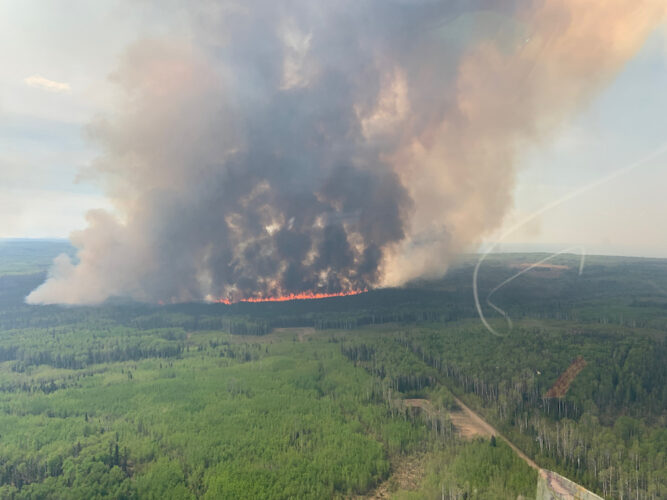
B.C. starts prep for wildfire season ‘earlier than ever’: Minister
March 25, 2024
By Canadian Biomass Staff
 Photo: Alberta Wildfire/Government of Alberta handout, May 15, 2023.
Photo: Alberta Wildfire/Government of Alberta handout, May 15, 2023. British Columbia is starting its preparation for wildfires “earlier than ever,” according to Bowinn Ma, the province’s Minister of Emergency Management and Climate Readiness.
“We have seen the devastating consequences of climate change on our communities and we are using lessons learned from last year to strengthen our approach to emergencies,” said Ma. “By taking a whole-of-government approach and working with local governments, First Nations and emergency-response partners, we can ensure we are as prepared as possible for whatever might come.”
Predictive technology being used
Stemming from the ongoing work of the Premier’s Expert Task Force on Emergencies, the province has enhanced wildfire preparedness and support for evacuees across B.C. This work includes incorporating advanced wildfire predictive technologies, expanding the number of firefighting tools available to BC Wildfire Service (BCWS) crews and streamlining training for Emergency Support Services (ESS) responders.
Additionally, the province has strengthened the BCWS hiring process by creating pathways for participation in wildfire response, specifically for applicants in rural and remote communities. This has resulted in more than 1,700 applications, which is double the number of applications received in 2023.
2023 worst fire season in B.C. history: Minister
“Last year’s wildfire season was the worst in our province’s history and we know how incredibly difficult it was for everyone,” said Bruce Ralston, Minister of Forests. “Our top priority is keeping people safe, which is why we continue to take significant action to prevent and prepare for wildfires as we head into spring and summer. We know the impacts of climate change are arriving faster than predicted. We will keep actioning the recommendations from the expert task force to make sure we are ready for wildfires when and where they happen.”
Following the 2023 wildfire season, the Province launched the Premier’s Expert Task Force on Emergencies to provide recommendations about how to apply lessons learned from the 2023 wildfire season to better prepare for and respond to future emergencies. The task force is collaborating with delivery teams from the ministries of Forests, and Emergency Management and Climate Readiness. This model of real-time collaboration allows the Province to translate the task force’s recommendations into actions in advance of the 2024 wildfire season.
Forecasts predict active spring season
Current forecasts indicate that British Columbia may experience an active spring-wildfire season due to persistent drought conditions. This activity is expected to increase if there continues to be limited precipitation over the next several weeks and months. Until significant and sustained rains occur, the risk of ignition will remain elevated.
As of the snow bulletin on March 1, 2024, the average provincial snowpack is at 66% of normal, based on the average from 1991 to 2020.
While a reduced snowpack may lessen the flood-risk hazard in some communities, extreme weather can still lead to flooding, and people and communities are encouraged to be prepared. There is also potential for prolonged drought, and communities and businesses are encouraged to take water-conservation measures early and plan for potential drought conditions.
“Many communities experienced severe drought conditions last summer. The potential for drought conditions this year is very real and we are taking steps to help people prepare,” said Nathan Cullen, Minister of Water, Land and Resource Stewardship. “We have boosted community emergency grants, water infrastructure and supports for farmers and ranchers, and we will keep finding ways to support people, communities, businesses and wildlife in the face of drought.”
Water-scarcity response plans
The province is providing tools to help communities with their water-scarcity response plans and is ready to support other planning efforts throughout the drought season. Local governments and First Nations will receive updates on drought conditions, including the long-term weather outlook.
Additionally, the province has been hosting workshops to help the agricultural sector prepare for drought. If required, the Province will reimburse local governments and First Nations for eligible expenses related to the costs of transporting drinking water and desalinization.
Quick facts
- Since the beginning of 2024, there have been seven wildfire starts, and some holdover wildfires from 2023 remain on the landscape.
- In 2023, approximately 2.84 million hectares burned in wildfires in B.C. and more than 600 residential structures were destroyed or partially damaged.
- BC emergency alerts were an important tool in the 2023 wildfire season and helped people get access to timely, potentially lifesaving information when they needed it.
- In 2023, the Province issued 24 emergency alerts for wildfire evacuation orders on behalf of communities.
- Since 2017, the Province has provided approximately $176 million to communities through the Community Emergency Preparedness Fund to enhance their resilience in responding to emergencies and mitigating future climate-related risks. Half of this funding was allocated in 2023.
- Throughout the 2023 wildfire season, approximately 48,900 people were placed under evacuation order and 137,000 were placed on evacuation alert.
Print this page